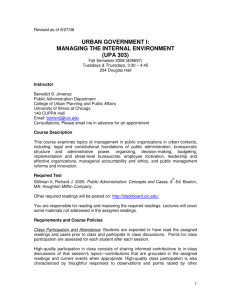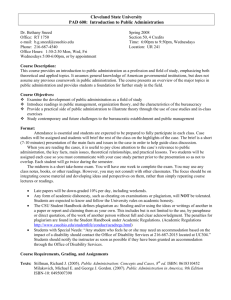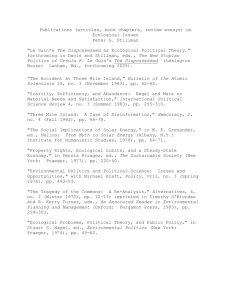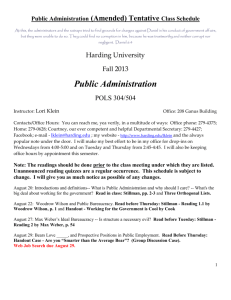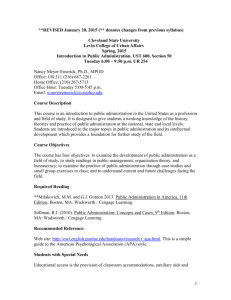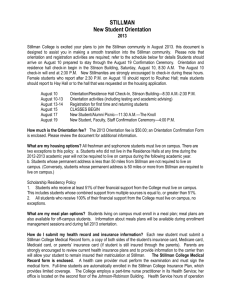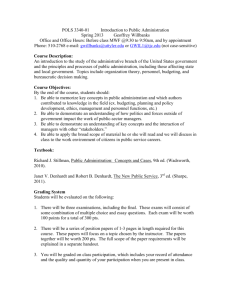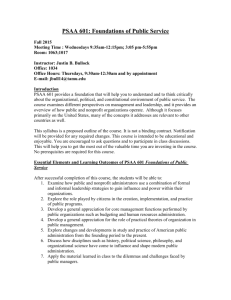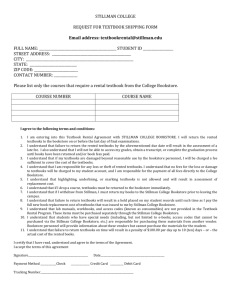Introduction to Public Administration & Governance
advertisement
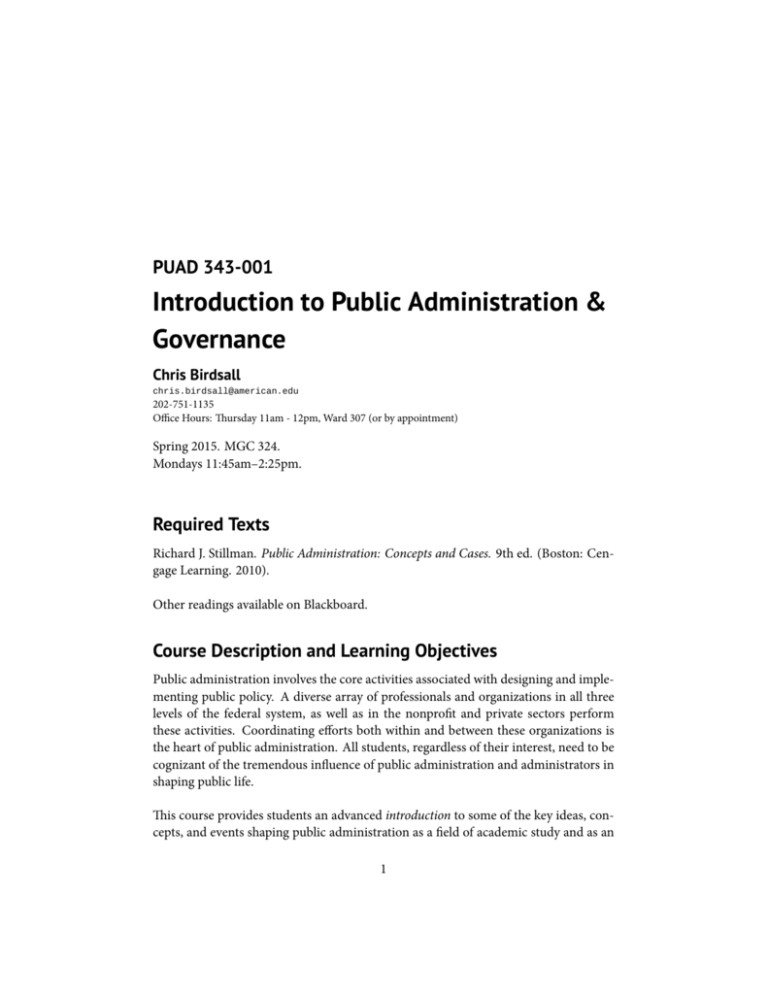
PUAD 343-001 Introduction to Public Administration & Governance Chris Birdsall chris.birdsall@american.edu 202-751-1135 Office Hours: Thursday 11am - 12pm, Ward 307 (or by appointment) Spring 2015. MGC 324. Mondays 11:45am–2:25pm. Required Texts Richard J. Stillman. Public Administration: Concepts and Cases. 9th ed. (Boston: Cengage Learning. 2010). Other readings available on Blackboard. Course Description and Learning Objectives Public administration involves the core activities associated with designing and implementing public policy. A diverse array of professionals and organizations in all three levels of the federal system, as well as in the nonprofit and private sectors perform these activities. Coordinating efforts both within and between these organizations is the heart of public administration. All students, regardless of their interest, need to be cognizant of the tremendous influence of public administration and administrators in shaping public life. This course provides students an advanced introduction to some of the key ideas, concepts, and events shaping public administration as a field of academic study and as an 1 2 area of professional practice. Upon successful completion of the course, students will: ⋅ Will have a general understanding of the history, theory, and practice of public administration. ⋅ Be able to assess the validity of administrative theory. ⋅ Be able to apply public administration concepts and ideas to contemporary problems and societal issues. ⋅ Develop a sense of best practices for producing reports and presentations in a team setting. Requirements & Grading Participation: 15% Attendance is mandatory. The success of this course depends on your active participation. Participation involves not only actively contributing to class discussion, but also listening respectfully to your classmates and responding thoughtfully to what they have to say. Your participation grade reflects both the quality and the frequency of your contributions to class. I only excuse absences in cases of personal or family emergencies. If an emergency prevents you from attending class please notify me as soon as possible. Midterm and Final: 25% & 30% Exams are short answer and essay, but predominately essay. You will be given a choice of questions (for example, three or four out of five questions). The final is cumulative. Team Project: 30% Unlike academic projects, government projects are rarely carried out and written up by one individual. To simulate what goes on in real-world public administration, you and three of your classmates will produce a written report (15 - 20 pages) and an oral presentation (limited to 20 minutes) on a topic relevant to concepts and ideas covered in class. Your team must secure my approval for your topic by Friday, February 13. A separate document provides further instructions on the assignment. 3 Policies Electronic Devices Phones. I do not allow the use of cell phones in class. Please keep your phone on silent during class. Laptops and Tablets. You may use laptops and tablets in class, but only for class-related purposes. Violations of this policy will reduce your participation grade. Food and Drink You may bring snacks and drinks to class, but you must pick up after yourself and be respectful of your classmates (i.e. keep noise and smells to a minimum). Academic Integrity All of the work you do in this class must adhere to the standards put forth in the university’s Academic Integrity Code, which can be found here: http://www.american. edu/academics/integrity/code.cfm. Your work must be entirely your own, and you must properly reference authors when citing their work. Failure to do this, or any other violation of the code, will result in failure of this class as well as possible academic sanctions. When in doubt, cite! Student Support Academic Support and Access Center (x3360, MGC 243). In addition to using the resources available in this department, you may take advantage of individual academic counseling, skills workshops, tutor referrals, supplemental instruction, and writing appointments in the Academic Support and Access Center. Students with disabilities: If you wish to receive accommodations for a disability, please notify me with a letter from the Academic Support and Access Center. As accommodations are not retroactive, timely notification at the beginning of the semester, if possible, is requested. Counseling Center (x3500, MGC 214). The Counseling Center offers counseling and consultations regarding personal concerns, self-help information, and connections to off-campus mental health resources. Writing Center (x2991, Battelle-Tompkins 228). The Writing Center offers free, individual coaching sessions to all AU students. In your 45-minute session, a student 4 writing consultant can help you address assignments, understand the conventions of academic writing, and learn how to revise and edit your own work. The Center offers appointments on the hour from 11 a.m. to 9 p.m. Monday through Thursday; 11 a.m. to 4 p.m. Friday, and 3 to 6 p.m. on Sundays. Center for Diversity & Inclusion (x3651, MGC 201 & 202). The Center for Diversity and Inclusion is dedicated to enhancing LGBTQ, Multicultural, First Generation, and Women’s experiences on campus and to advance AU’s commitment to respecting & valuing diversity by serving as a resource and liaison to students, staff, and faculty on issues of equity through education, outreach, and advocacy. The Center’s email is cdi@american.edu. Dean of Students Office (x3300, 408 Butler Pavilion) This office offers one-on-one meetings to discuss academic, adjustment, and personal issues that may be interfering with your ability to succeed academically. The DOS office also verifies documentation for students who have medical or mental health issues that cause them to be absent from class. Emergency Preparedness In the event of a declared pandemic (influenza or other communicable disease), American University will implement a plan for meeting the needs of all members of the university community. Should the university be required to close for a period of time, we are committed to ensuring that all aspects of our educational programs will be delivered to our students. These may include altering and extending the duration of the traditional term schedule to complete essential instruction in the traditional format and/or use of distance instructional methods. Specific strategies will vary from class to class, depending on the format of the course and the timing of the emergency. Faculty will communicate class-specific information to students via AU e-mail and Blackboard, while students must inform their faculty immediately of any absence due to illness. Students are responsible for checking their AU e-mail regularly and keeping themselves informed of emergencies. In the event of a declared pandemic or other emergency, students should refer to the AU Web site (american.edu/emergency) and the AU information line at (202) 885-1100 for general university-wide information, as well as contact their faculty and/or respective dean’s office for course and school/college-specific information. 5 Course Schedule The following outlines the path for the course. Come to class prepared to discuss both the assigned readings and case studies. Remember to read the introductions in each of the assigned Stillman readings, as they provide context that will help you extract key points and concepts. Week 1 (January 12): Introduction No readings or assignments. Team Introductions Week 2 (January 19): No Class (MLK Day) Week 3 (January 26): Scope and Purpose – What is public administration? Readings Wilson (1887) –“The Study of Administration” (Stillman, 1.1) Stillman –“The Study of Public Administration in the United States” (Stillman, 1.2) Appleby (1945) – “Government is Different” (BB) Kettl (2002) – “Administrative Traditions” (BB) Case Study Martin (1948) –“The Blast in Centralia No. 5: A Mine Disaster No One Stopped” (Stillman, Case Study 1) Week 4 (February 2): Structure – The Bureaucracy Readings Weber (1914/1946) – “Bureaucracy” (Stillman, 2) Merton (1940) – “Bureaucratic Structure and Personality” (BB) Goodsell (1983/2004) – “The Case for Bureaucracy” (BB) Case Study Lardner (1992) –“How Kristin Died” (Stillman, Case Study 2) 6 Week 5 (February 9): The General Environment – The Concept of Ecology Readings Gaus (1947) – “The Ecology of Public Administration” (Stillman, 3) Riggs (1980) – “The Ecology and Context of Public Administration: a Comparative Perspective” (BB) Conlan (2006) – “From Cooperative to Opportunistic Federalism” (Stillman, 5) Case Study Cooper and Bryer (2007) –“William Robertson: Exemplar of Politics and Public Management Rightly Understood” (Stillman, Case Study 3) Team Meetings February 19: TEAM PROJECT PROPOSALS DUE Week 6 (February 16): The Political Environment Readings Rosenbloom (1993) – “Have an Administrative Rx? Don’t Forget the Politics!” Long (1949) – “Power and Administration” (Stillman, 4) Meier (1997) – “Bureaucracy and Democracy: The Case for More Bureaucracy and Less Democracy” (BB) Romzek and Dubnick (1987) – “Accountability in the Public Sector: Lessons from the Challenger Tragedy” (BB) Case Study Casamayou – “The Columbia Accident” (Stillman, Case Study 4) Week 7 (February 26): Public Administrators Readings Stillman (1996) – “Inside Public Bureaucracy” (Stillman, 7) Taylor (1912) – “Scientific Management” (BB) Mayo (1945) – “Hawthorne and the Western Electric Company” (Stillman, 6) Wise – “The Public Service Culture” (Stillman, 11) Case Study Sontag (2001) – “What Brought Bernadine Healy Down?” (Stillman, Case Study) 7 Week 8 (March 2): MIDTERM Week 9 (March 9): NO CLASS (Spring Break) Week 8 (March 16): Public Administrators – The Front Lines of Public Service Readings Lipsky (1980) – “Street-Level Bureaucracy: The Critical Role of Street-Level Bureaucrats” (BB) Maynard-Moody and Musheno (2000) – “State Agent or Citizen Agent: Two Narratives of Discretion” (BB) Krislov (1967) – “Representative Bureaucracy” (BB) Keiser (2010) – “Representative Bureaucracy” (BB) Case Studies “A Happy Ending” and “Watching the Prostitute from a Distance” from MaynardMoody and Musheno’s Cops, Teachers, Counselors: Stories from the Front Lines of Public Service (BB) Week 11 (March 23): Key Elements of Public Service Management – Decision Making and Communications Readings Lindblom (1959) – “The Science of Muddling Through” (Stillman, 8) Garnett – “Administrative Communication (Or How to Make All the Rest Work)” (Stillman, 9) Case Study Rosegrant – “The Shootings at Columbine High School” (Stillman, Case Study 9) Team Meetings Week 12 (March 30): Public Budgeting Readings Rubin (1990) – “The Politics of Public Budgets” (Stillman, 12) Key (1940) – “The Lack of a Budgetary Theory” (BB) 8 Joyce (1993) – “Using Performance Measures for Federal Budgeting: Proposals and Prospects” (BB) Case Study Taubman (2007) – “Death of a Spy Satellite Program” (Stillman, Case Study 12) Week 13 (April 6): Collaborative Public Management Readings Thomson and Perry (2006) – “Collaborative Processes” (Stillman, 10) Agranoff (2006) – “Inside Collaborative Networks: Ten Lessons for Public Managers” (BB) Milward and Provan (2000) – “Governing the Hollow State” (BB) Case Study Jain, et al. (2007) “Government as a Catalyst” (Stillman, Case Study 10) Week 14 (April 13): Ethics and Accountability Readings Friedrich (1940) – “Public Policy and the Nature of Administrative Responsibility” (Stillman, 15) Finer (1941) – “Administrative Responsibility in Democratic Government” (Stillman, 15) Waldo (1980) – “Public Administration and Ethics: A Prologue to a Preface” (Stillman, 16) Case Study Pfiffner (2005) – “Torture and Public Policy” (Stillman, Case Study 15) Week 15 (April 20): Present and Future Trends in Public Administration Readings Light (2006) – “The Tides of Reform Revisited” (Stillman, 13) Kettl (2000) – “The Transformation of Governance: Globalization, Devolution, and the Role Government” (BB) Heclo (1978) – “Issue Networks and the Executive Establishment” (Stillman, 14) 9 Moynihan and Ingraham (2010) – “The Suspect Handmaiden: The Evolution of Politics and Administration in the American State” (BB) No Case Study Team Meetings Week 16 (April 27): Team Presentations May 1 (Friday): TEAM PAPERS & EVALUATIONS DUE VIA EMAIL BY MIDNIGHT Week 17 (May 4): FINAL EXAM
